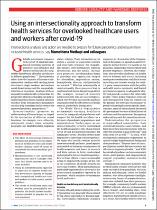| dc.contributor.author | Mothupi, Mamothena | |
| dc.contributor.author | Dasgupta, Jashodhara | |
| dc.contributor.author | Hosseini Jebeli, Seyede Sedighe | |
| dc.date.accessioned | 2023-06-20T07:14:02Z | |
| dc.date.available | 2023-06-20T07:14:02Z | |
| dc.date.issued | 2023 | |
| dc.identifier.citation | Mothupi, M. et al. (2023). Using an intersectionality approach to transform health services for overlooked healthcare users and workers after Covid-19. BMJ (Clinical research ed.), 381, e072243.10.1136/bmj-2022-072243 | en_US |
| dc.identifier.issn | 17561833 | |
| dc.identifier.uri | 10.1136/bmj-2022-072243 | |
| dc.identifier.uri | http://hdl.handle.net/10566/9118 | |
| dc.description.abstract | Globally, government responses
to the covid-19 pandemic reinforced prevailing patterns of
privilege and prejudice and
further entrenched the inequitable distribution of health and disease
in different populations.1-3 These patterns
reflect how the legacies of historical discrimination combine with existing power
structures to shape, condone, and continue
social disadvantage and the unequal distribution of resources. Analysis of these
inequalities within health systems from the
perspective of intersectionality can help us
understand their drivers and find solutions
to reduce them. Tackling these inequalities
can also help transform health services for
improved pandemic preparedness.4 | en_US |
| dc.language.iso | en | en_US |
| dc.publisher | NLM (Medline) | en_US |
| dc.subject | Public health | en_US |
| dc.subject | Covid-19 | en_US |
| dc.subject | World Health Organization (WHO) | en_US |
| dc.subject | Race | en_US |
| dc.subject | Ethnicity | en_US |
| dc.title | Using an intersectionality approach to transform health services for overlooked healthcare users and workers after Covid-19 | en_US |
| dc.type | Article | en_US |

